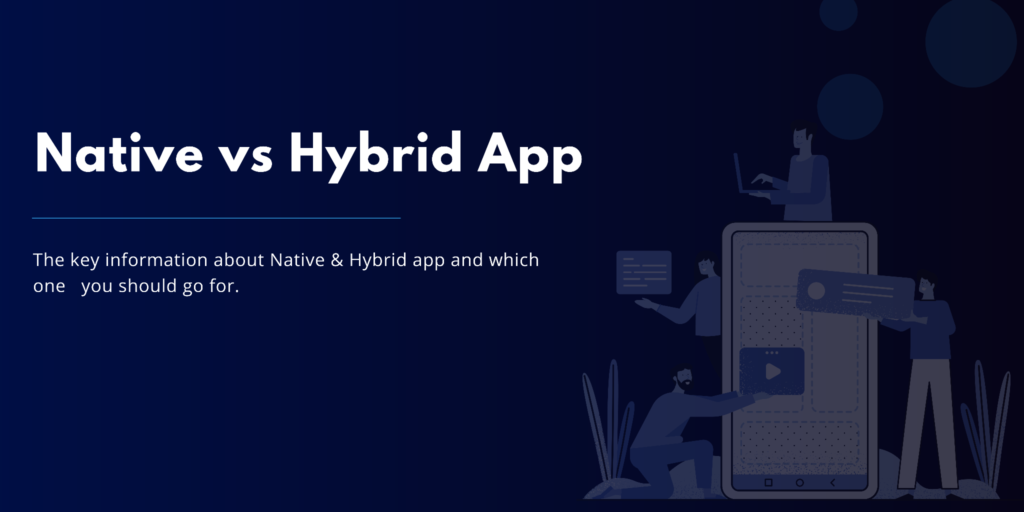Native & Hybrid App Development: What’s the Difference?

Having an app is one of the best ways to scale your business. After all, it allows you to peek directly into your customer’s mobile phones which are close to them 24/7. According to Comscore, mobile users spent 87% of their time in apps compared to some 13% on the web. So, if you’re going to have an app for your business. Kudos to you!
But the grind to choose which type of app to go for is mind-consuming. You’ll find tons of advice like going for a native app, hybrid app, or web app. Everyone has different opinions but only you know your business, users, budget, and time. No one can decide better than you on what is good for your business in the long term.
This article is going to give you the information you need on Native and Hybrid apps and which one you should go for.
Let’s have a look!
What are Native apps?
Native apps are designed for a specific operating system – either iOS or Android following very technical guidelines of the operating system. To run a native app, the developer will write separate code for both Android and iOS systems. This makes the native app quite expensive for the business but this higher price tag is totally worth the benefits and experience native apps can provide to your users.
Adopting a native app helps you integrate additional functions such as an in-app camera, GPS, microphone, contacts, and SMS. These will directly enhance your app user experience and help you achieve an organic user base.
Native apps are developed with Java, Kotlin, Swift, and Objective-c. These technologies specifically make your native apps more faster and performance reliable. The development cycle for the native app is usually longer than hybrid ones with multiple rounds of coding, testing, running and updating. You need to have a specialized developer dedicated to building for the specific operating system. Their high-performance checking helps them get full support of Google play and the App store marketplace.
Native apps are more responsive in terms of data protection and security and can be run in an offline mode.
Some of the well-known examples of the native apps are Whatsapp, Spotify, Pokemon go, and Waze. Today these apps are known for their huge user insights, design touchpoints, and high performance.
What are Hybrid apps?
Hybrid apps work across any operating system and they require one single codebase that can run on any platform. Hybrid apps have a flexible development cycle with less time and cost. Hybrid apps help your users communicate irrespective of what device they’re using and benefit you by covering a large user base.
Users will have the option to access your app either directly from the browser or download it from Google Play or the App store. There’s no need to have separate code or guidelines in the Hybrid approach. Hence, hybrid apps are web applications with the essence of native elements. Because Hybrid apps are basically web-based applications so they are built on HTML5, CSS3, Bootstrap & Responsive Web, JQuery, Angular JS, Node.JS & D3.JS.
Another benefit of a hybrid app is associated with the browser, so any changes in the codebase will directly update the app features across all platforms and users need no to update the app separately. Same way handling and fixing bugs is also easy in hybrid mode and developers have to do just one on a single set of code.
But these benefit comes with their own limitations. Because one codebase is optimized for every platform, hybrid apps suffer a little in terms of their performance and user experience.
You won’t find the best speed every time and attractive UI design in your app. The app speed will be totally dependent on the browser network.
Till now, we’ve got a detailed sneak of what are hybrid and native apps. But if you are still confused about which app you should opt for your business.
Hybrid vs Native apps: Which one you should choose.
To clear up all your doubts, here’s a list of features a mobile app should have and you can get insights on which option will be good for your business requirements.
User experience
User experience is dependent on enjoyable and effective interaction between users and the app. It’s just like your users having a fun or insightful time while being in your app and even can spend long hours on your app.
If your business model requires users to spend more time on the app like gaming or shopping application, then the native approach is your only go-to option. Here your app is the biggest source of traffic and your responsibility is to make users’ every second worth staying in the app.
In case your source of traffic is diverse from the web, android, or iOS and then you are all set and free to go for hybrid app development.
Loading time
In the world of app marketing, every second matters. Customers download apps because they want to save time and want to have quick access to applications anytime and everywhere. In a such hurry, if your app takes one second extra to load, you’re going to lose out a customer as they’ll switch to competitors.
The speed of the hybrid app totally depends on the browser speed. So if your web speed is lacking, then direct your users are going to face more loading time. In the case of a native application, the loading time is not an issue at all. The efficiency of the operating system gives a better speed experience to users.
So, if you’re planning to have a large user base for your app then a Native application should be your choice.
Performance
Your success relies on the performance of your app. There are some major factors to consider to analyze the requirement of your business and which type of app you should go for. First, make your app seamless and bug free for user’s convenient.
Hybrid apps are easir to maintain because developer need to work on only one souce code and any update can be easility available to users without actually updating the apps manually. Whereas native apps is spread across platforms and requires special attention for each device. Because native apps are seamles and efficient from client side, they are equally bulkier on backend.
So, in order to give best performance to users you’ve to pay large on behind the scene.
Data protection
The application is an integral asset for any organization and it inherits a lot of user’s trust with regards to their confidential information. So, it’s a big responsibility to hold the huge data in the safest mode and protect them from any malicious intender.
Coming on to comparison, hybrid apps are little more prone to security risks due to the fact that they operate on browser. Native apps are considered to be more secure than hybrid ones because native apps are built on platform specific security features. Hybrid apps are venerable to web based attacks but with necessary precautions and regular security test, these threats can be avoided.
Security is the foremost concern for any tech solution. You’ve to glace at your business needs and go with the best medium with all the security measures.
Conclusion
We’ve seen how hybrid and native apps are equally dominating the market. Choosing between the two is a debatable choice. So, it’s advisable to look at your business, target audience, market size and conduct a competitor research to find how you can fill the gap they are lacking. Going with hybrid or native app is more of a business decision.
If you’re looking to enhance your online pesence, 5RiOS is there to help you right from choosing a right technology to developing a solution. You can fill out the form to book a free consultation session with our team.
